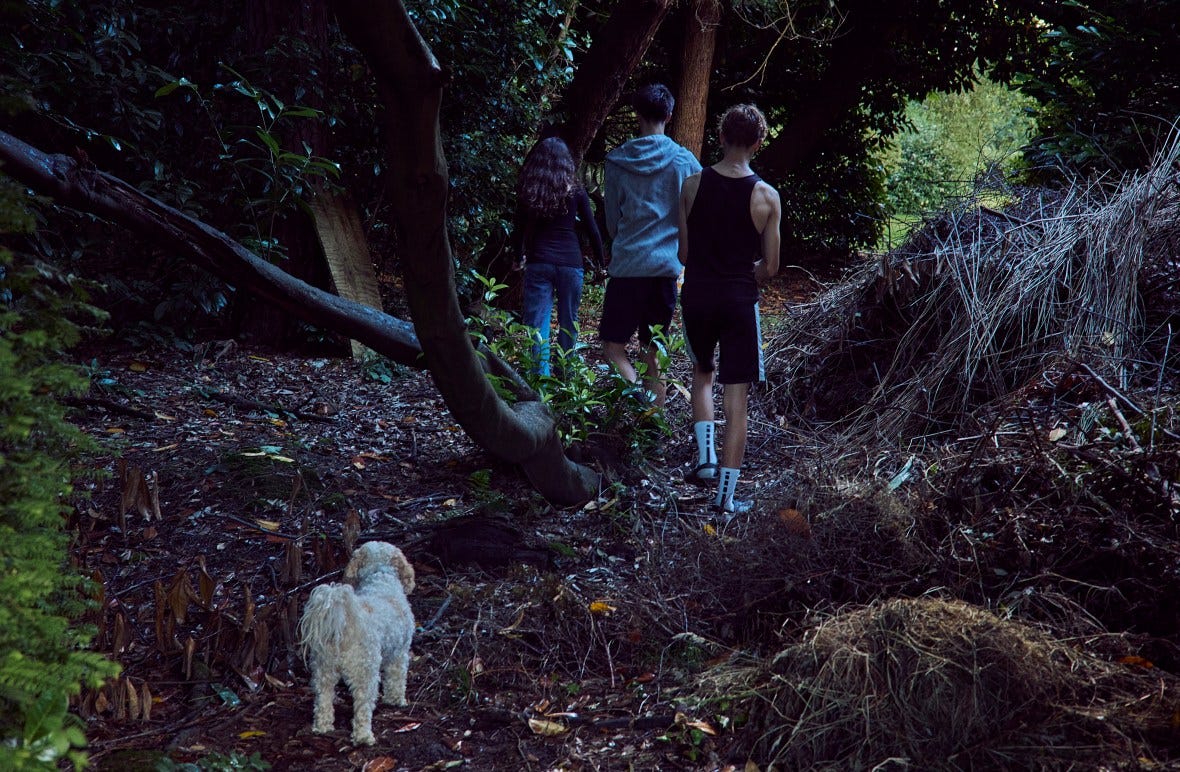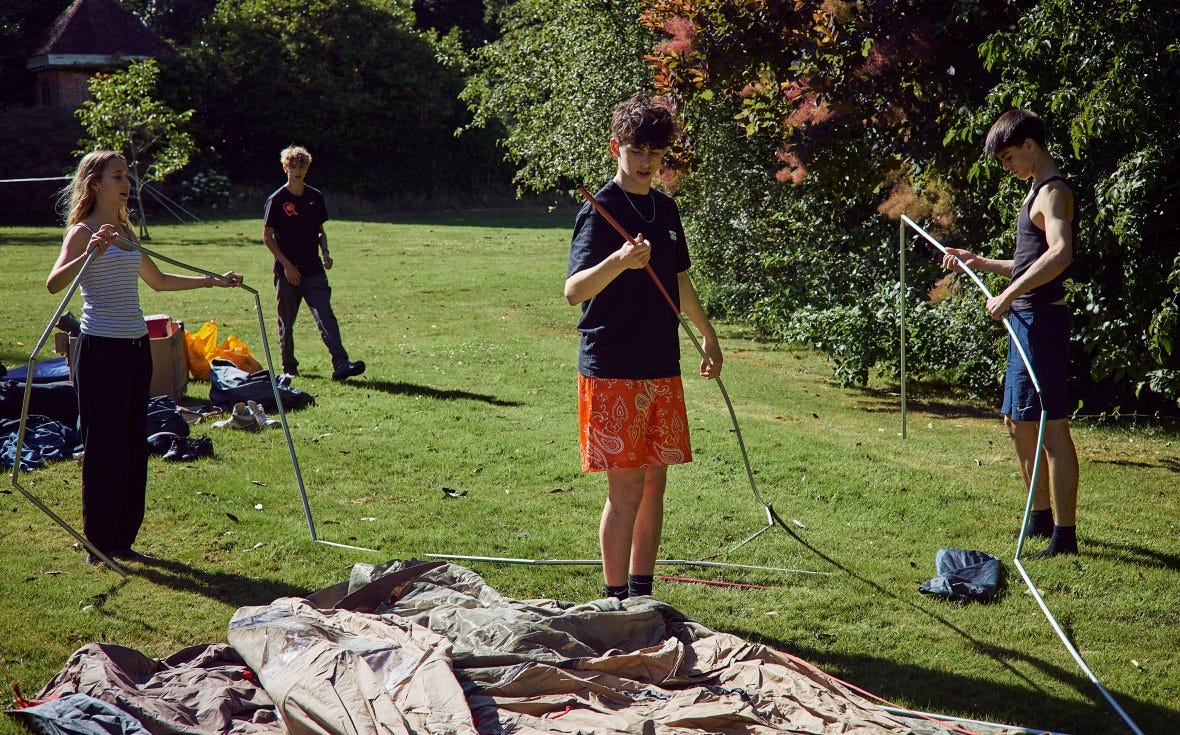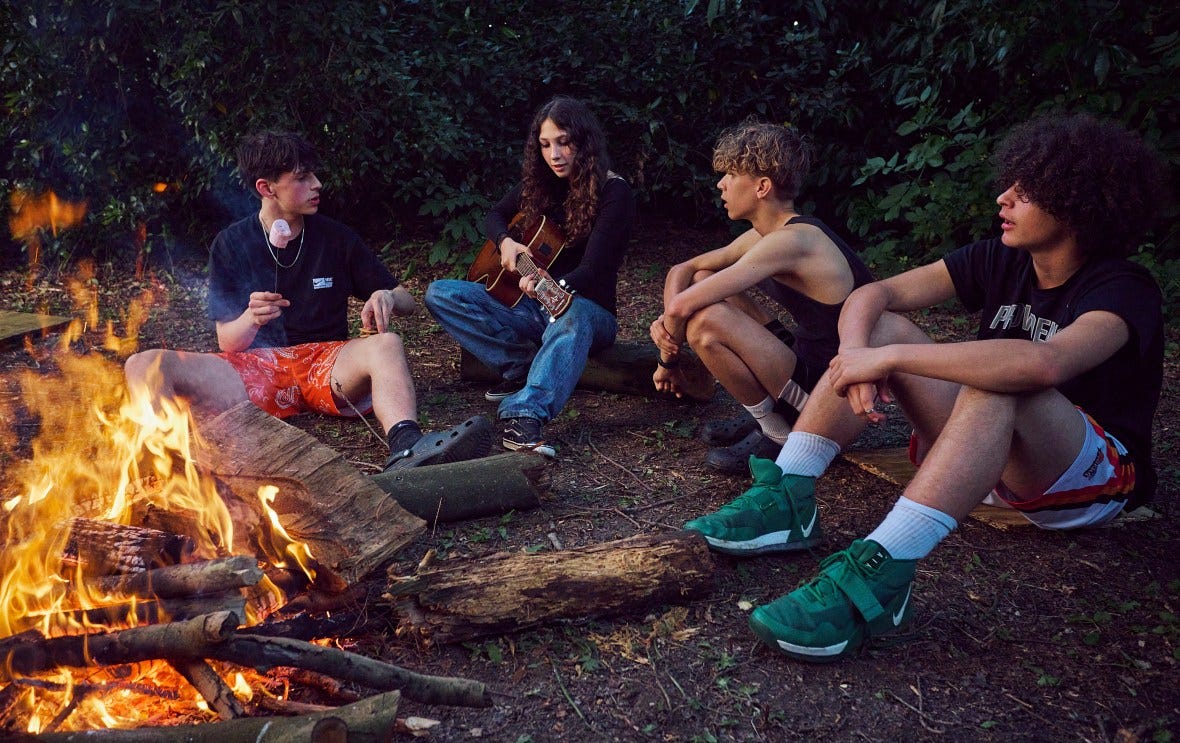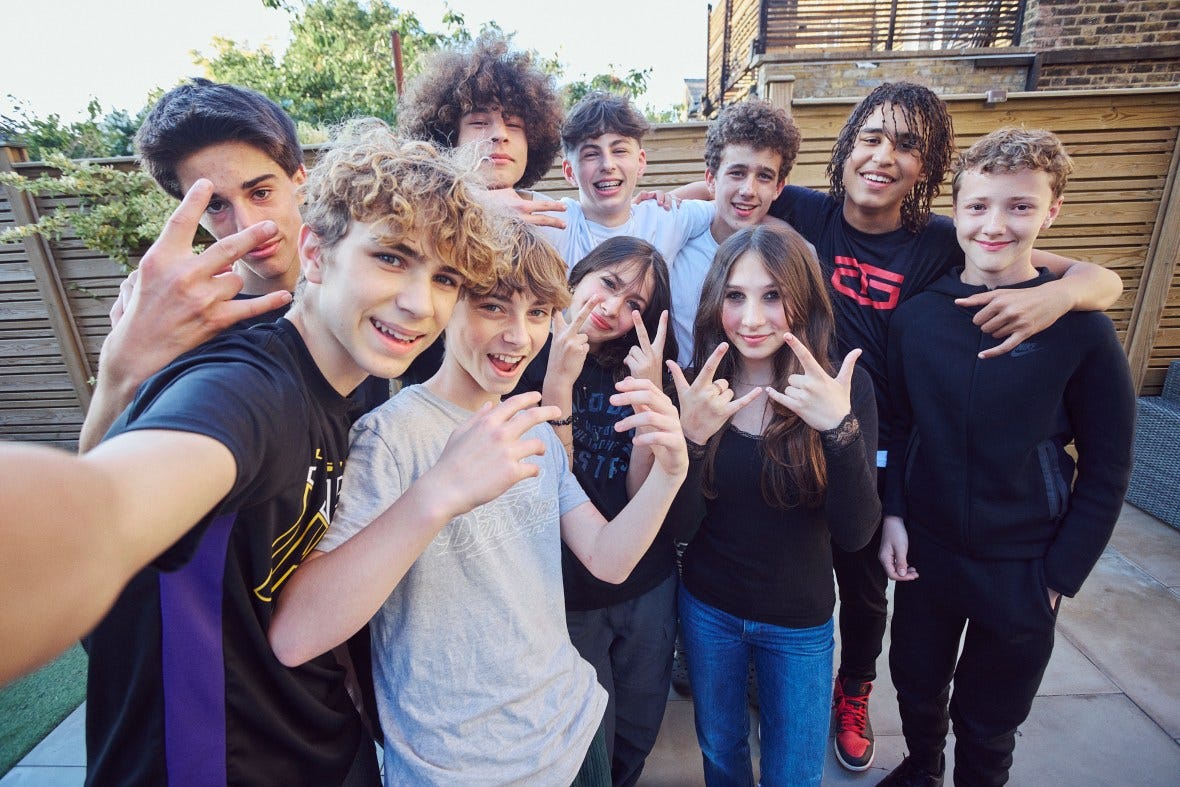Journalist Sends Kids off on a Smartphone-Free Camping Trip – Unsupervised. Adults Quake. Kids Flourish.
The Sunday Times (UK) just ran a major story illustrating the twin prescriptions in The Anxious Generation
Introduction from Jon Haidt:
Many journalists have written some version of this story: “I ditched my smartphone for a week and here’s what happened!” Usually, they encounter some problems and withdrawal symptoms along the way, followed by some benefits. In the end, the journalists typically return to their smartphone-based lives, having learned a few valuable lessons.
These self-experiments are fun to read, but they do little to test the claims I made in The Anxious Generation for three reasons.
The writer is an adult
One week is too short because it takes two or three to overcome withdrawal symptoms and develop new behavior patterns
The writer did it alone! The central point of Part 4 of the book was that we need collective action to escape a collective problem. If you take away screens from one kid while all her friends stay online, then you’ve isolated her. If you don’t replace the virtual world with more independence in the real one, the whole experiment will feel to the kid as though a door is slamming shut instead of a new one opening.
At last, a journalist has done the proper test, and the results are thrilling. Decca Aitkenhead, who writes for The Sunday Times (UK), recruited her two sons (ages 13 and 14), along with six of their male friends, plus two teen girls with whom some of the boys were acquainted. They agreed to go for a month using basic phones with no internet access (although they got access to their smartphones for one hour each evening). In other words, Decca did a study with teens, for a long enough period, in a group.
She then did something harder and more amazing: she added a mega-dose of independence. She sent them on an unsupervised two-day camping trip––a chance to experience independence, risk, and problem-solving in the real world, together, just as kids had always done before the 1990s.
The camping trip confirmed everything that Lenore Skenazy has been saying since her 2009 book Free Range Kids (updated in 2021): Young people are starved for independence in the real world. Given some, they flourish.
Decca’s group was incompetent at first, but the kids developed competence as the experiment went on. They took risks (some, admittedly, dumb). They tried new things. And without smartphones glued to their hands, they connected. Yesterday, I heard Decca’s son Jake on a radio program, talking about how much he loved the month-long project. He said, of the camping trip, that it gave him “one of the best nights of my year, maybe of my life.”
I invited Lenore, who co-founded Let Grow with me, to comment on the lessons from the camping trip, below. Lenore helped me write the chapters in Part 4 of The Anxious Generation, and proposed many of the “real world” ideas and actions there, for parents and schools. The camping trip illustrates a collective action to implement the fourth norm: “Far more independence, free play, and responsibility in the real world.”
But first, I want to comment on one aspect of the phone side of the story: the sex difference. The evidence that social media harms girls more than boys is substantial and consistent, and it shows up in the essay. Decca had a much harder time persuading any girls to cut back on social media for a month, and it's not because they love it. It’s because girls are far more deeply trapped, hooked, and committed to spending hours a day on the platforms, even though they know it is bad for them. As one said, “You know it’s all fake, but you still feel like it’s real. You still can’t help comparing yourself with everyone who looks pretty, and feeling bad about yourself. And you’re going to get addicted. It’s literally like a drug.” Both the girls tell Decca, “Apps are targeting girls younger and younger,” and one adds, “It’s sickening. The people who own them are ruining children’s lives just to get money.”
Boys in general are not as hooked and harmed by social media, but they spend even more time on screens and are more likely than girls to get hooked by video games and pornography. To be clear, like girls with social media, most boys are not addicted to those platforms, and that seems to be true of the eight boys in Decca’s essay. And yet, even still, these boys enjoyed major improvements in their lives from greatly reducing phone use and hanging out with their friends, phone-free. In that radio interview, Decca’s son said that in the weeks since the experiment ended, he has kept his screen time down to around 25% of what it was before, and he is using some of those recovered hours each day to read books and get more sleep.
Decca’s essay illustrates that collective action can be as simple as a few families aligning on following the four norms recommended in The Anxious Generation, so that none of the kids feel alone. Decca spoke with each of the kids afterward, who all said that doing it solo would have been awful:
“It would have felt like a punishment,” to Rowan; “weird and isolating” to Elliot. This may help explain why Edie and Rose [the 2 girls] sound least enthusiastic by the end. None of their local friends took part, indicating that Haidt might be right that only collective action, rather than individual family rules, will work.
Those four norms for collective action, once again, are:
No smartphones before high school (age 14)
No social media accounts until 16
Phone-free schools
Far more independence, free play, and responsibility in the real world
For advice on how to implement the norms in your own life, see our “Take Action” page at AnxiousGeneration.com.
And now, here’s Lenore, summarizing Decca’s experiment and the lessons learned from implementing the fourth norm.
– Jon
It was after interviewing Jon about The Anxious Generation that British journalist Decca Aitkenhead decided to try an experiment with her sons Jake, 14, and Jody, 13: She would lock away their smartphones for 23 hours a day and replace them with Light Phones that allowed calls, texts, music, maps and little else. The sweetener was that they could sell the phone at the end of the month. That’s what it took to get six of their buddies, 13-15, to participate as well.
It was harder to get girls, but eventually, Decca snagged two.
The ensuing article in yesterday’s Sunday Times Magazine is funny, warm, and shocking, especially because most of these kids already had screen time limits. Decca notes they also seemed pretty well-adjusted, “unafflicted by the social anxiety and depression Haidt writes about.” So it would seem that there was not a lot of room for improvement.
And yet the experiment changed their lives—and Decca’s.
How?

The boys had used their smartphones mostly for Snapchat, Spotify, and sports videos, wrote Decca, which seemed rather “wholesome.” The girls spent far more time on social media – and desperately wished they didn’t.
“There’s no escape because your social popularity is totally linked to your social media,” said Rose, 14, who’d spent 41 hours online that week.
“It’s a trap,” said her sister Edie, 15. “Do you know why I still sleep with stuffed cuddly toys? To try to get back to how I used to feel when I felt happy and free. Before all this shit kicked in.”
Halfway through the month, Decca suddenly realized she’d focused on phones but completely ignored the second half of Jon’s anti-anxiety prescription – “curiously overlooked in all the debate about his book”— more autonomy.
Kids today have almost no unsupervised time. Yet for most of human history, kids have played and roamed in mixed-age groups, without adults. That’s how they learned to manage “risk, responsibility, and relationships.”
Safety fears have “increasingly confined children indoors, denying them developmentally essential adventures.” As a result, many are “too fearful and fragile to function outside their bedrooms. [Haidt] urges us to reintroduce physical freedom to their childhoods.”
So Decca hatched a plan.
She’d send the kids on a one-night campout, with only their Light Phones.
No adults.
The kids, experienced campers, loved the idea.
Her newspaper did not. The editor declared any campfire a “no-no.” The lawyer wanted to GPS the teens and send a chaperone to shadow them. Decca refused and, five pages of waivers later, she won.
Then, almost immediately, she wondered if maybe the worrywarts had been right.
To begin their adult-free adventure, Decca had to drive the kids to a Tube stop in London. They took the Tube to a train station, then took a train out of London to a bus, which then took them to the countryside. But for that first car trip, they packed the car so carelessly, that “the doors couldn’t shut.”
Once on their own, however, they made their way (with some wrong turns) to a field owned by Decca’s friend and set up camp.
When Decca arrived at noon the next day, as planned, she found the weather drizzly and the kids “electric.”
What was the best part of the trip? “All of it,” they told her. “Oh my God, so much fun!” “Sooo much fun.” “The fire was amazing. We got a ton of logs from the wood, and we made s’mores…”
“As the accounts of their adventure tumble out,” Decca writes, “two things become clear. The first will not please our health-and-safety team. The riskier things got, the more they enjoyed it.” (Not that we endorse crazy risks!)
The second?
“[B]y simply eliminating adults, even something as familiar as camping becomes thrilling,” Decca wrote. “What difference, I ask, would it have made had I taken their Tube, sat in another carriage on the train, and camped nearby in my own tent? Jake looks horrified. ‘I would have hated it.’ Through clenched teeth, ‘Hated every single second.’”
“Don’t you see?” says Albie earnestly. “The dream thing for people our age is to go camping and just have fun without parents. The no-adult aspect is literally the dream to us.”
They packed up the car efficiently this time.
“All the hapless childish idiocy that worried me when they were planning the trip…has vanished. In under 36 unsupervised hours, they appear to have grown up by about two years.”
Back home, the kids were changed.
All of them said they hadn’t missed their phones. They started using theirs less and doing more in the real world.
They also hadn’t missed the constant supervision. In fact, Decca’s son Jody, 13, spent his first night home alone, ever. “I can’t explain it exactly,” he told his mom. “I just really liked the feeling of it.”
The fact that “every single teen would have ‘hated’ to do the experiment alone,” writes Decca, proved to her that change requires lots of kids not having smartphones. And lots of parents letting their kids do far more on their own.
She also learned that:
Even well-adjusted kids who aren’t watching porn and self-harm videos become better-adjusted after a month of Light Phones and two days of independence.
It is sickeningly ironic that “school timetables, sports clubs, public transport, homework are all organized around the assumption that every teenager owns a smartphone.”
Simply tracking kids changes their childhood. As one of the boy’s moms told Decca, “He came back from the camping trip revitalized. And it’s the same with tracking, isn’t it? Actually, giving them a bit of space and freedom is good for them.”
Being allowed to do some things on their own seems to benefit kids at least as much as taking away their phones.
We—Jon and I—agree and urge you to read the whole article.
For help weaning kids off phones or onto “dumb” phones, please visit The Anxious Generation’s Take Action page
And for easy, actionable ideas on how to start giving kids more independence and free play, especially collectively via school-wide programs, or via Independence Therapy, visit LetGrow.org.











All I can say is: I want to see more of this! More teens without smartphones (and in nature!) flourishing. Bravo to the journalist/mother who had the courage to do this.
My oldest is 14, and when he is biking in our neighborhood or at a church activity, I'm tempted to wish I had a way to reach him. But then I remember that I'm building trust in him, and he is building confidence in himself, and if he can't call me every time something goes wrong, he'll build more independence, which is the point of raising children after all: to turn them into capable adults.
I hope that this experiment will serve to inspire and be replicated by families who recognize the need for a "new normal". It was interesting to note that it was the adults who were quick to try and put limits and oberservation on the camping trip, "The editor declared any campfire a “no-no.” The lawyer wanted to GPS the teens and send a chaperone to shadow them."
True independence cannot flourish if we remove all risks.
Switzerland is a place where personal responsibility is encouraged and expected. One place where this contrast is apparent is in the public swimming pools. In Canada a pool of approx 25 by 15 meters is observed by a minimum of six to eight lifeguards who frequently count heads, berate youths who summersault into the water, and stop and running or rough play, and control the timing of going down the slides. In contrast the public swimming pool we visit each summer in my hometown has three pools (25 by 25; 50 by 25; and 10 by 25 meters), diving boards, a climbing wall, and waterslides. How many lifeguards? Two to three. Swimmers are allowed to run, dive in any which way they like, and wait of their own accord at diving boards and slides.
Public pools are only one example of a princliple that permeates the culture. This "lack of supervision" does not result in more accidents, and instead produces citizens of independence and self-responsibility. Not tracking our children or constantly checking in on them and instead spending time listening to the stories they tell us about their day, can be a simple first step in a direction of independence.